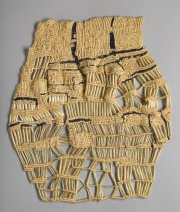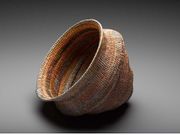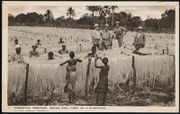Difference between revisions of "Sisal"
JMcGlinchey (talk | contribs) |
|||
| (11 intermediate revisions by 3 users not shown) | |||
| Line 1: | Line 1: | ||
| − | [[File:2004.2108-SC185596.jpg|thumb|'' | + | [[File:2004.2108-SC185596.jpg|thumb|Knotted fiber, called 'World egg'; MFA #: 2004.2108]] |
| + | [[File:Coiled basket MFA.jpg|thumb|Coiled basket<br>MFA# 2004.2101]] | ||
| + | [[File:Drying sisal MFA.jpg|thumb|Drying Sisal photogravure<br>MFA# 2012.5637]] | ||
== Description == | == Description == | ||
| − | A strong coarse fiber obtained from the leaves of the agave plant, ''Agave sisalana,'' native to Central America. Sisal was used for clothing the the ancient Mexicans and Aztecs. It was exported to Europe in the 16th century and is now cultivated in Central and South America as well as Africa (Kenya and Tanzania). Sisal contains cellulose, lignin (~6%) along with pectins and waxes. It is a strong, stiff fiber with a pale cream color. Sisal is typically dyed bright colors with direct or acid dyes. Sisal is used for brushes, upholstery padding, matting, rugs, handbags, hats, ropes, cordage and sacks. It is also used for papermaking. | + | A strong coarse fiber obtained from the leaves of the [[agave]] plant, ''Agave sisalana,'' native to Central America. Sisal was used for clothing the the ancient Mexicans and Aztecs. It was exported to Europe in the 16th century and is now cultivated in Central and South America as well as Africa (Kenya and Tanzania). Sisal contains cellulose, lignin (~6%) along with pectins and waxes. It is a strong, stiff fiber with a pale cream color. Sisal is typically dyed bright colors with direct or acid dyes. Sisal is used for brushes, upholstery padding, matting, rugs, handbags, hats, ropes, cordage and sacks. It is also used for papermaking. |
== Synonyms and Related Terms == | == Synonyms and Related Terms == | ||
| Line 8: | Line 10: | ||
sisal (Agave sisalana); tampico (Agave rigiida); Salvador sisal (Agave letonae); zapupe fiber (Agave zapupe); henequen or Yucatan sisal (Agave fourcroydes); Maguey or cantala (Agave cantala); sisal hemp;sisal(Esp.) | sisal (Agave sisalana); tampico (Agave rigiida); Salvador sisal (Agave letonae); zapupe fiber (Agave zapupe); henequen or Yucatan sisal (Agave fourcroydes); Maguey or cantala (Agave cantala); sisal hemp;sisal(Esp.) | ||
| − | == | + | == Physical and Chemical Properties == |
Cross section = horseshoe; Fiber length = 60-120 cm (2-4 feet) Strength = 4.5 g/denier. | Cross section = horseshoe; Fiber length = 60-120 cm (2-4 feet) Strength = 4.5 g/denier. | ||
| Line 16: | Line 18: | ||
Paper fiber type: non-woody. Using transmitted light microscopy, fibers appear thick walled with tapering blunt ends. Pulp may also contain primary xylems with very tight spirals, tracheary elements, pale grey cells, stringy elements, and unwound spiral thickenings. Appearance with [[Graff "C" stain]]: greyish-blue. Average dimensions of fibers: length 3mm, width 20μm. Common pulping method: [[soda process|soda]]. | Paper fiber type: non-woody. Using transmitted light microscopy, fibers appear thick walled with tapering blunt ends. Pulp may also contain primary xylems with very tight spirals, tracheary elements, pale grey cells, stringy elements, and unwound spiral thickenings. Appearance with [[Graff "C" stain]]: greyish-blue. Average dimensions of fibers: length 3mm, width 20μm. Common pulping method: [[soda process|soda]]. | ||
| − | == Additional | + | ==Additional Images== |
| − | + | <gallery> | |
| − | + | File:Sisal 10x.jpg|Sisal paper pulp stained with Graff "C" stain at 10x | |
| + | File:Sisal 40x.jpg|Sisal paper pulp stained with Graff "C" stain at 40x | ||
| + | File: Sisal 40x bluntends.jpg|Sisal paper pulp stained with Graff "C" stain, blunt ends | ||
| + | </gallery> | ||
== Comparisons == | == Comparisons == | ||
| − | [[media: | + | [[media:Properties of Natural Fibers.pdf|Properties of Natural Fibers]] |
| − | |||
| − | |||
| − | == | + | == Resources and Citations == |
* Hoechst Celanese Corporation, ''Dictionary of Fiber & Textile Technology'' (older version called Man-made Fiber and Textile Dictionary, 1965), Hoechst Celanese Corporation, Charlotte NC, 1990 | * Hoechst Celanese Corporation, ''Dictionary of Fiber & Textile Technology'' (older version called Man-made Fiber and Textile Dictionary, 1965), Hoechst Celanese Corporation, Charlotte NC, 1990 | ||
| Line 52: | Line 55: | ||
* Art and Architecture Thesaurus Online, http://www.getty.edu/research/tools/vocabulary/aat/, J. Paul Getty Trust, Los Angeles, 2000 | * Art and Architecture Thesaurus Online, http://www.getty.edu/research/tools/vocabulary/aat/, J. Paul Getty Trust, Los Angeles, 2000 | ||
| + | * Marja-Sisko Ilvessalo-Pfäffli. ''Fiber Atlas: Identification of Papermaking Fibers'' (Springer Series in Wood Science). Springer, 1995. | ||
| + | * Walter Rantanen. "Fiber ID Course." Integrated Paper Services. June 2013. Lecture. | ||
[[Category:Materials database]] | [[Category:Materials database]] | ||
Latest revision as of 13:01, 31 May 2022
Description
A strong coarse fiber obtained from the leaves of the Agave plant, Agave sisalana, native to Central America. Sisal was used for clothing the the ancient Mexicans and Aztecs. It was exported to Europe in the 16th century and is now cultivated in Central and South America as well as Africa (Kenya and Tanzania). Sisal contains cellulose, lignin (~6%) along with pectins and waxes. It is a strong, stiff fiber with a pale cream color. Sisal is typically dyed bright colors with direct or acid dyes. Sisal is used for brushes, upholstery padding, matting, rugs, handbags, hats, ropes, cordage and sacks. It is also used for papermaking.
Synonyms and Related Terms
sisal (Agave sisalana); tampico (Agave rigiida); Salvador sisal (Agave letonae); zapupe fiber (Agave zapupe); henequen or Yucatan sisal (Agave fourcroydes); Maguey or cantala (Agave cantala); sisal hemp;sisal(Esp.)
Physical and Chemical Properties
Cross section = horseshoe; Fiber length = 60-120 cm (2-4 feet) Strength = 4.5 g/denier.
Ash contains rod-shaped crystals
Paper fiber type: non-woody. Using transmitted light microscopy, fibers appear thick walled with tapering blunt ends. Pulp may also contain primary xylems with very tight spirals, tracheary elements, pale grey cells, stringy elements, and unwound spiral thickenings. Appearance with Graff "C" stain: greyish-blue. Average dimensions of fibers: length 3mm, width 20μm. Common pulping method: soda.
Additional Images
Comparisons
Resources and Citations
- Hoechst Celanese Corporation, Dictionary of Fiber & Textile Technology (older version called Man-made Fiber and Textile Dictionary, 1965), Hoechst Celanese Corporation, Charlotte NC, 1990
- Rosalie Rosso King, Textile Identification, Conservation, and Preservation, Noyes Publications, Park Ridge, NJ, 1985
- Marjory L. Joseph, Introductory Textile Science, Holt, Rinehart and Winston, Fort Worth, TX, 1986
- J.Gordon Cook, Handbook of Textile Fibres:I Natural Fibres, Merrow Publishing Co. , Durham, England, 1984
- Identification of Textile Materials, The Textile Institute, Manchester, England, 1985
- Matt Roberts, Don Etherington, Bookbinding and the Conservation of Books: a Dictionary of Descriptive Terminology, U.S. Government Printing Office, Washington DC, 1982
- Book and Paper Group, Paper Conservation Catalog, AIC, 1984, 1989
- G.S.Brady, Materials Handbook, McGraw-Hill Book Co., New York, 1971 Comment: p. 727
- Richard S. Lewis, Hawley's Condensed Chemical Dictionary, Van Nostrand Reinhold, New York, 10th ed., 1993
- Random House, Webster's Encyclopedic Unabridged Dictionary of the English Language, Grammercy Book, New York, 1997
- The American Heritage Dictionary or Encarta, via Microsoft Bookshelf 98, Microsoft Corp., 1998
- Art and Architecture Thesaurus Online, http://www.getty.edu/research/tools/vocabulary/aat/, J. Paul Getty Trust, Los Angeles, 2000
- Marja-Sisko Ilvessalo-Pfäffli. Fiber Atlas: Identification of Papermaking Fibers (Springer Series in Wood Science). Springer, 1995.
- Walter Rantanen. "Fiber ID Course." Integrated Paper Services. June 2013. Lecture.





